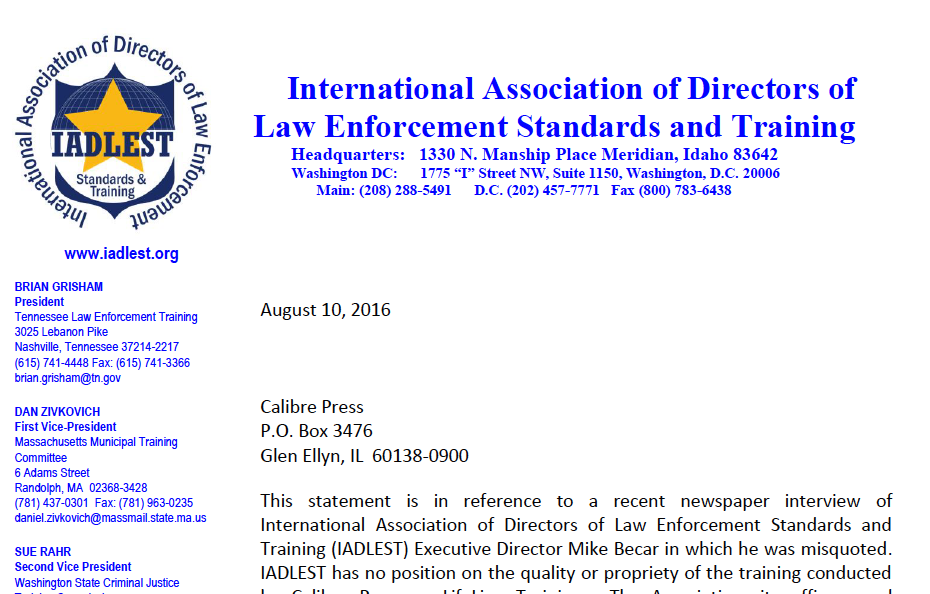Calibre Press is a 37-year-old training company with an impeccable reputation in law enforcement and criminal justice circles. Calibre Press was acquired by Jim Glennon and Lisa Gitchell in 2012, and Glennon, a career officer with a stellar and storied career, immediately went about revamping and revitalizing the company.
“Calibre Press is one of the most highly respected police training entities in the country,” says Kenyen R. Brown, U.S. Attorney for the Southern District of Alabama. “Jim Glennon is an incredible trainer with great credibility among line officers, and our reviews for this training have always been top-notch. Highly recommended.”
Prior to 2012 Calibre Press offered a single class, the Street Survival Seminar. In addition to completely updating the SSS curriculum, Glennon and Gitchell added more than a dozen new courses on topics ranging from communications to leadership to bias to women in command. Meanwhile Calibre Press did something unprecedented: It opened its training up to the media. It has been covered by Bloomberg, NPR, and The New York Times, as well as dozens of local affiliates. (Read what they had to say, for examples, here and here and here.)
Unfortunately, a campaign of misinformation is underway that seeks to discredit Calibre Press’ efforts to make American police more transparent, progressive, and accountable. This campaign doesn’t bother to summon the ample facts available and has made no effort to learn more about Calibre Press and it’s training. Instead it trades in hearsay and innuendo. Following are its core tenets, all of which are easily disproven.
Myth #1: Calibre Press Conducts Militarized Police Training
Fact: Calibre Press doesn’t conduct tactical training at all. It makes no recommendations regarding equipment use or deployment strategies. Calibre Press instead focuses on mindset and communications training.
Myth #2: Calibre Press Promulgates a “Warrior” Mindset
Fact: There are times when police officers are called upon to act as warriors in order to protect civilian lives (during the San Bernardino terrorist attacks, for example). But far more often, and as we train, police are guardians. It’s noteworthy that the foremost critic of “warrior policing,” Sue Rahr of the Washington State Criminal Justice Training Commission, has written for CalibrePress.com and recommends our training.
Myth #3: Calibre Press Teaches Police Officers to Fear the Public
Fact: Nothing is further from the truth. Statements have been made that would suggest as much, but only by people who haven’t attended our training. One of the more prominent and cited critiques is derived from a misquotation and was quickly retracted. (See retraction letter, right.)
(See retraction letter, right.)
Myth #4: Calibre Press Is Secretive
Fact: No other police training company has been more open with the media. As long as a journalist has demonstrated a sense of seriousness and objectivity coming in, they have been welcomed. We have–in large measure due to unfair characterizations such as those being addressed here–become much more restrictive in the past year. In the search for easy answers and blame, police and police training have become sitting targets. Sadly, innuendo goes a long way in the world of social media activism.
But for a sense of its beliefs, CalibrePress.com publishes original content several times a week. Its content pushes boundaries and seeks more meaningful discussions. Topics range from current events to mindfulness to cyber security to history to mental health. If you really want to know who we are, sign up for our newsletter and we’ll send it to you! Attend one of our popular webcasts.
Conclusion
Calibre Press isn’t sitting these at-times difficult discussions out. We are at the table. We are proud of our training. And we are also eager to listen and engage opposing points of view. In fact, our future as the preeminent law enforcement training company depends upon doing just that.
“This is the training reformers want to see law enforcement to be involved in,” says Glennon. “We expose officers to variety, which is the medium of real life, and emphasize stress and how it affects perception. We round it out with communication and leadership training.”










0 Comments